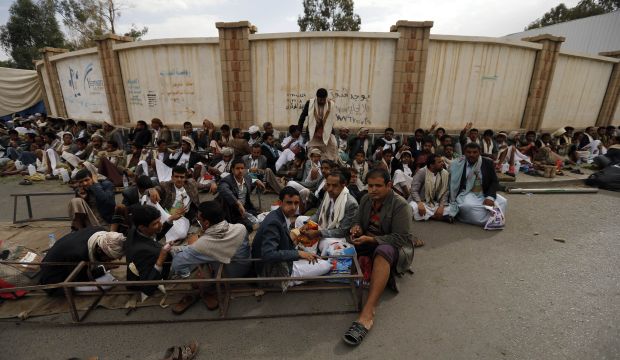
Followers of the Shi’ite Houthi movement sit at an anti-government protest camp in Sana’a, Yemen on August 23, 2014. (Reuters/Khaled Abdullah)
Sana’a, Asharq Al-Awsat—The Houthi rebels occupying sites around the Yemeni capital in their thousands have announced the conditions for ending their protests on Monday.
In a letter to Yemeni President Abd Rabbuh Mansur Hadi, the movement, which has been protesting around Sana’a for a week, issued seven demands which included reforms of Yemen’s economy, media, and political system, and say the protests will continue until their demands are met.
The protests began with calls for Yemen’s government to resign and restore fuel subsidies which were slashed in July, raising the price of gasoline by 60 percent and diesel by 95 percent.
Talks between the Houthis and the government in the northern city of Saada collapsed on Sunday, reportedly because the Houthis insisted on the immediate restoration of fuel subsidies. Representatives of the movement accused the committee appointed by President Hadi to mediate between the two sides of bias, and said it left the city before receiving the letter containing the Houthis demands.
Sultan Al-Burkani, a member of the committee that negotiated with Houthi leader Abdul Malik Al-Houthi, said the movement was responsive at the start of the talks, and agreed on the first day to specific arrangements to end the protests. However, it withdrew agreement the next day, leading to the failure of the talks.
“We proposed new ideas and agreed to all their declared demands . . . and we pointed out the seriousness of the ongoing escalation and the presence of camps at the entrances of the capital, but unfortunately, the next day, we went back to square one,” Burkani said.
The Houthis’ first demand, as stated in the letter, is the reinstatement of subsidies, the immediate launch of efforts to tackle official corruption, and the formation of a committee to deal with the problems it causes the Yemeni economy.
The letter also calls for the dismissal of the current government and the appointment of an independent prime minister, as well as the implementation of the National Dialogue Conference by state institutions, and allowing the Houthis to participate in government.
Yemeni leaders concluded a 10-month National Dialogue Conference in January this year, which made a number of recommendations for reforming the constitution and political system in the country. The Houthis’ fourth demand was that the decision of the committee supervising its implementation be revised.
The letter then goes on to demand that the Yemeni media commit itself to the principle of impartiality and reject sectarian and ethnic incitement, and that an agreement on a mechanism to apply all of the movement’s demands be agreed, in detail.
Finally, the letter states that the Houthis are willing to remove their protest camps at the entrances of Sana’a once the government agrees to their demands, and that the camps inside the city will be removed when the new government is formed.
At the end of the letter, which was delivered by Houthi activist Ali Al-Bakhiti, Abdul Malik Al-Houthi writes: “We stress that the vision presented by us stems from our eagerness for the security, stability and interests of our country, and to disrupt the scheming of those who have no concern other than to profit from the pain and suffering of the Yemeni people.”
